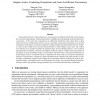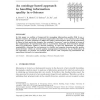73 search results - page 7 / 15 » Concurrency Annotations |
IEEEPACT
2009
IEEE
13 years 5 months ago
2009
IEEE
Transactional memory is being advanced as an alternative to traditional lock-based synchronization for concurrent programming. Transactional memory simplifies the programming mode...
TACAS
2010
Springer
14 years 2 months ago
2010
Springer
Abstract. Heap-Hop is a program prover for concurrent heap-manipulating programs that use Hoare monitors and message-passing synchronization. Programs are annotated with pre and po...
PPOPP
2011
ACM
12 years 10 months ago
2011
ACM
We propose a cooperative methodology for multithreaded software, where threads use traditional synchronization idioms such as locks, but additionally document each point of potent...
CONCURRENCY
2008
13 years 7 months ago
2008
context. In contrast to previous approaches that take a very abstract view of IQ properties, we allow scientists to define the quality characteristics that are of importance to the...
COORDINATION
2009
Springer
14 years 8 months ago
2009
Springer
A future is a well-known programming construct used to introduce concurrency to sequential programs. Computations annotated as futures are executed asynchronously and run concurren...


